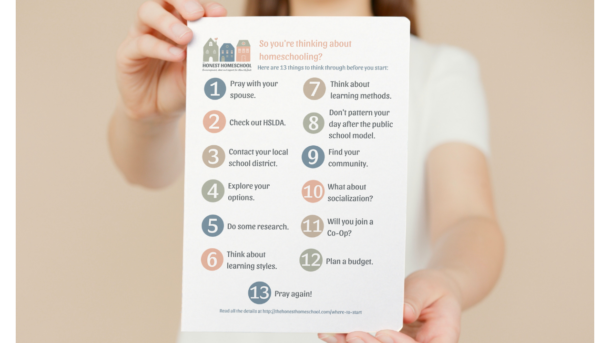Where To Start Your Homeschool Journey
You’ve thought about it.
You’ve prayed about it.
You’ve discussed it endlessly with your spouse.
You’ve talked to your homeschooling friends.
You’ve been stressing over it
You’ve even done some research on the different approaches to homeschooling.
Still the question remains, but HOW DO I DO IT ??
What does a day of homeschooling actually look like?
Where will we sit?
Where will the kids DO THEIR WORK?
I don’t have a teaching credential.
I don’t know how to teach.
Don’t we need desks?
My house isn’t big enough.
Good questions. GREAT questions. And you’re not alone.We’ve ALL been there, and it’s ok. You’re asking all the right questions.
When we decided we’d give homeschooling a try, I was petrified. I had 2 kids at the time, 4 and 2, and I wanted to be ready to start school when my oldest turned 5. I had just quit my full time job, let the nanny go, moved out of state and was a stay at home mom for the very first time. What was I thinking??!!
So we began homeschooling with the idea that this was the plan for THIS YEAR. We’d re-evaluate later and see what the Lord wanted for the following year. Somehow I felt better that I was only making a 1-year commitment to homeschooling. How badly could I mess up my kids in 1 year?
Homeschooling looks different in every household. That’s the inherent beauty of it. You’re not bound by a schedule that was determined by someone else.
Someone who doesn’t know YOUR kids, or your family.
There are some things that we think are important to scope out before you start:
Pray with your spouse.
Is homeschooling what the Lord wants you to do now? Spend time praying together. Talk about your goals for your children. We’d suggest writing out a few goals that you’d like to pursue with your kids. Maybe even write a Family Charter for your homeschool. What are the rules? Expectations? What is the structure?
In our home, Mom was the teacher, but Dad was the Principal.
“Work first, then play” was often spoken, sometimes multiple times a day.
We decided our verse for that first year was Colossians 3:17:
“And whatever you do, whether in work or deed,
do it all in the name of the Lord Jesus,
giving thanks to God the Father through him.”
I bought a large poster of this verse and displayed it on the wall of our homeschool room. It stayed there for 10 years, inspiring us to focus on WHO we were doing all this for.
Check out HSLDA.
Homeschool Legal Defense Association
A MUST resource for every Christian homeschooling family. HSLDA offers lists of the homeschooling laws in each state. Find out the requirements for your state and for the school district you live in. Consider joining their mailing list and supporting HSLDA by purchasing a membership, it is money well spent.
Contact your local school district.
Ask what paperwork the district requires, and at what age they require it. In my state, we signed a 1-page Notice of Intent to Homeschool document each year with our name and our child’s name, that’s it. And we didn’t have to start doing that until our children were 8 yrs old. We began homeschooling at around age 5, but we weren’t required to file papers with the district until age 8.
If your children attend public school currently and you want to bring them home to homeschool, there may be other exit paperwork that must be completed. Find out from the district office what the requirements are. Make sure you date and keep copies of all documents.
Our children participated in public school sports programs beginning in Middle School. I would drive them to the school each day for practice. We never had any problems being a homeschooler on a public school team. Coaches were always welcoming and happy to have our kids on the team
Explore your options.
What type of homeschooling will fit your family? Traditional textbook learning, online courses, co-op, public school/ homeschool co-op? Maybe some combination of each of those.
Do some research.
Get on the mailing lists or email list for homeschool curriculum companies on-line. Spend time reading and noticing the Scope and Sequence of subjects. When should I begin spelling? What about science? Many of these companies also offer “Where to Start Homeschooling” articles that you may find helpful as well.
One of our contributors to The Honest Homeschool suggests using an All-In-One style curriculum for your first year. This is so that you have everything you need to get started all in one place, providing a more stress-free first year experience! Some of these programs incorporate scripted lessons for the parent as well, taking all the guesswork and planning off your shoulders. All the subjects are planned and scheduled. Consider beginning your homeschool career with one of these programs.
Think about learning styles.
Children learn in different ways. If you have more than one child, you probably have already discovered this! Same parents, same house, totally different learning style! God has a sense of humor, doesn’t he?
Auditory Learners learn best by hearing instructions.
Visual Learners must see the instructions
Kinesthetic Learners learn best while moving their bodies
Read/Write Learners learn best when reading and taking notes
(some may suggest more categories, or a combination of these)
Many curriculums can be adapted to each of these styles.
Think about learning methods.
There are several popular methods of homeschooling:
Charlotte Mason
Unit Studies
Classical Method
Unschooling
…and many others
Do some research and ask the Lord to guide you to the method that fits your family best. Start there, but you may want to change methods later. That’s great – that’s one of the many freedoms of homeschooling! The important part is just to START!
Don’t pattern your day after the public school model.
You’ll be done with your school day hours before the public school loads up their buses! Desks aren’t required. Many homeschool families do school at the kitchen table, at the breakfast counter, on the floor and on the couch. School happens everywhere. You don’t need a dedicated school room if you don’t have the space. The schedule of your day varies greatly depending on the ages of your children. Naps and feeding schedules are important! Start by planning your day around those.
Find your community.
Find friends who homeschool! I feel like this is the most important part of starting to homeschool! We need to have other moms around us to support us. A network of support is so incredibly helpful. We’re made to need each other! Support may look like church friends, co-op ladies, an IG support group. A community of other homeschooling families also provides a place where your kids can make friends
We need them and they need you.
What about socialization?
This comment from folks always makes me laugh. Socialization begins at home. When we train and correct our children to get along with each other, respect their parents, honor their grandparents, we’ve set the very important ground work towards teaching our kids to get along well with others.
Will you join a Co-Op?
We’ve all had wonderful experiences with different co-ops over the years. That became our social day of the week. Most of the Co-ops we attended were just 1 day per week, often Wednesdays or Fridays. All of ours were at churches in our area, sometimes at the churches we attended, other times they were at other local churches. Co-ops usually offer mostly elective classes, assuming all the core work is done at home. There also may be homeschool/public school partnership programs available. Search on-line for homeschool co-ops in your area.
Some co-ops ask that families complete at least 1 year of homeschooling before they join a co-op so that parents and co-op administrators have a good sense of where the student is academically, and what grade level courses they should begin at the Co-op.
Plan a budget.
Talk to your spouse about a budget for your school. Homeschool curriculums are not cheap, but they don’t always have to be. Explore many free options for learning. Teachers Pay Teachers is a great inexpensive resource for teaching ideas. Many of us purchased curriculum and books at used book stores. We’d swap or borrow books with other homeschooling families.
Pray again.
Start each school day with prayer, and close it with prayer. You’re raising the next generation of church leaders! It’s a mighty task! Lean on the Lord and let him direct your family’s homeschooling journey.














